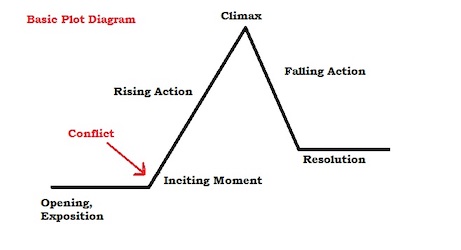

Literary Elements - Combined5th Grade |
|
|---|---|
|
|
|
|
|
 5th Grade Reading - Literary Elements - Combined Lesson
5th Grade Reading - Literary Elements - Combined Lesson
Literary Elements - Combined
Literary Elements of Narrative Writing: Setting, Characters, Plot, and Theme.
- Setting
- The setting of a story is generally the time and place in which the events happen. It includes the physical, historical, and cultural settings. The cultural setting has to do with the beliefs, customs, and values of a particular group of people at a particular place and time. The setting also includes the situation in which a character or characters find themselves, based on things that have already occurred before the beginning of the story. There may be just one or multiple settings in a story. There could be a main setting and various "sub-settings" within it. Setting affects the characters and the plot of the story.
When analyzing a story, ask yourself —
- Does the physical setting itself enable or cause events that are important to the plot? If so, what elements of the physical setting contribute to the events?
- How do the historical and cultural settings of the story affect how characters behave or react to events and other characters? Could the same events occur in the past that could happen today? Would or could the same events occur in a different cultural or historical setting?
- Characters
- Characters are the people in a story. Depending on the story, characters could be animals, imaginary creatures, or even sentient magical objects. A reader can learn about a character through his or her thoughts, feelings, words, actions, and interactions with other characters, as shared by the author. Main characters often go through meaningful changes in a story. The relationships and conflicts between characters are what drive a story's plot forward.
When analyzing a story, ask yourself —
|
- Plot
- The plot of a story is the series of connected events that make up the main part of the story. Most literary plots follow a general pattern. At the beginning of the story, the setting is established, and the main characters are introduced to the reader. The conflict in the story is introduced soon after, usually through an incident or event that sets off the rising action. This series of events leads to the climax. After the climax, the falling action leads to the resolution at the end of the story.

When analyzing a story's plot, ask yourself —
|
- Theme
A theme of a literary work is a message, lesson, moral, or meaning that can be drawn from it. It is not a summary of characters and events or a description of a written work's topic. The theme rises above the written story or poem itself. It is what the reader can learn from what happens to the characters in a story or from how an author reflects upon a topic in a narrative essay or poem. Any literary work could have multiple themes.
When analyzing a literary work for themes, ask yourself —
|
REMEMBER: The four elements of narrative writing—setting, characters, plot, and theme—work together to make a complete story. The plot is the series of events that characters in a given setting experience. The theme or themes must be inferred from the plot, including how characters react to conflicts, change throughout the story, and bring the story to resolution. When analyzing narratives, look for how these four elements are interconnected.
Copyright 2025




